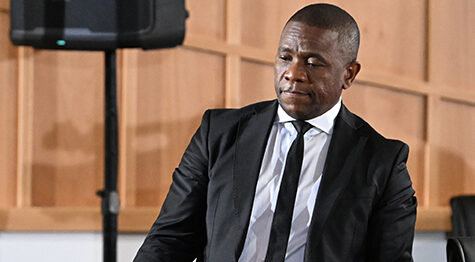Advocate Lawrence Mrwebi, a former Special Director of Public Prosecutions, has accused Lieutenant General Nhlanhla Mkhwanazi of knowingly providing false testimony under oath during the proceedings in the Commission of Inquiry into Criminality, Political Interference, and Corruption in the Criminal Justice System.
In a detailed affidavit, Mrwebi argues that Mkhwanazi’s claims about his role in the withdrawal of charges against Lieutenant General Richard Mdluli in 2011 are not only false but were made with the intent to mislead the inquiry and the public.
“Mkhwanazi gave false evidence, knowing his evidence to be false or not knowing or believing it to be true,” Mrwebi stated, citing Section 6(2) of the Commissions Act, which criminalises perjury.
Testimony peppered with ‘inaccuracies’
Perjury, as defined under South African law, occurs when a person gives false evidence under oath, knowing it to be false or acting recklessly without verifying its truth. Mrwebi claims Mkhwanazi’s testimony was riddled with inaccuracies and deliberate misrepresentations.
“Mkhwanazi falsely stated that I instructed the withdrawal of the case against Mdluli regardless of the evidence, that my decision caused the investigations to stop, and that I wrote a second letter declaring my decision final,” Mrwebi explained.
“These claims are not only untrue but were made without any effort to verify the facts, despite the existence of readily accessible reports and evidence.”
Mkhwanazi’s testimony, delivered on September 19, painted a damning picture of Mrwebi’s role in the Mdluli case. He alleged that Mrwebi’s actions amounted to interference in the criminal justice system, effectively “killing” the case against Mdluli. According to Mkhwanazi, Mrwebi’s decision to withdraw charges was made “regardless of the evidence” and led to the cessation of investigations.
Lack of evidence linking Mdluli to crimes
Responding to these allegations, Mrwebi categorically denied any wrongdoing, stating that his decision was based solely on the lack of evidence linking Mdluli to the alleged crimes.
“The NPA Prosecution Policy Directives are very specific: no prosecution may be instituted unless there is evidence on oath linking the accused to the elements of the crime and there are reasonable prospects of success,” Mrwebi explained.
The charges against Mdluli stemmed from transactions involving the trade-in of his private BMW vehicle and the purchase of two other BMWs by Crime Intelligence (CI). It was alleged that Mdluli fraudulently benefited from these transactions to the tune of approximately R42,000. However, Mrwebi maintains that the evidence in the docket at the time did not implicate Mdluli in any criminal activity.
“There was no evidence in the docket to suggest that Mdluli had any role to play in the two transactions regarding the purchase of these two BMWs, nor was there any evidence to suggest that he instructed or was in any way a party to any of those transactions in any form,” Mrwebi stated.
He further explained that the transactions were conducted by general Barnard, a supply chain manager at CI, and that the matter required further investigation, particularly the declassification of documents within CI.
“The perusal of the docket suggested that Mdluli was effectively arrested and charged in circumstances where there was no evidence that linked him to the crime at all at the time,” he added.
Public scrutiny
Mrwebi’s decision to withdraw the charges against Mdluli in December 2011 was met with significant public and media scrutiny. However, he insisted that the decision was justified and aligned with the NPA’s directives. “Having considered the docket and the report of the prosecutor, I instructed that charges against Mdluli be withdrawn,” Mrwebi explained.
He said that the withdrawal was provisional and suggested involving the Inspector-General of Intelligence (IGI) to facilitate access to critical documents. “Unfortunately, it appeared that my suggestions in this regard were viewed as obstructionist,” he noted.
To support his defence, Mrwebi cited numerous reports from prosecutors and investigators that highlighted the lack of evidence against Mdluli. These reports, spanning from 2011 to 2014, consistently pointed to challenges in linking Mdluli to the alleged crimes and the need for further investigation.
For instance, a report dated November 21, 2012, concluded that prosecutors were “not yet in a position to advise on any charges to be preferred against any suspects as they were still working on the investigations.” Similarly, a report from May 22, 2013, noted that the investigations were far from complete and faced significant challenges, including the declassification of documents.
Probe never stopped
“The developments outlined from December 2011 until about June 2014 clearly indicate that the investigations in the Mdluli matter never at any stage stopped,” Mrwebi asserted. He added that the delays in the case were due to the complexities of the investigation and not any interference on his part.
Mrwebi criticised Mkhwanazi’s testimony, accusing him of dishonesty and recklessness. “What I find disappointing mostly about Mkhwanazi’s testimony is the fact that it demonstrates a certain level of dishonesty because despite being privy to the explanation about the concerns I raised about the case against Mdluli, he, with a straight face, presents a false narrative to the inquiry,” Mrwebi stated.
He further argued that Mkhwanazi’s claims were not only false but were made with the intent to mislead the commission and the public. “It is beyond doubt that he gave false evidence on the propriety of my decision in the Mdluli matter, well knowing that such evidence was false or not knowing or believing it to be true,” Mrwebi concluded.



